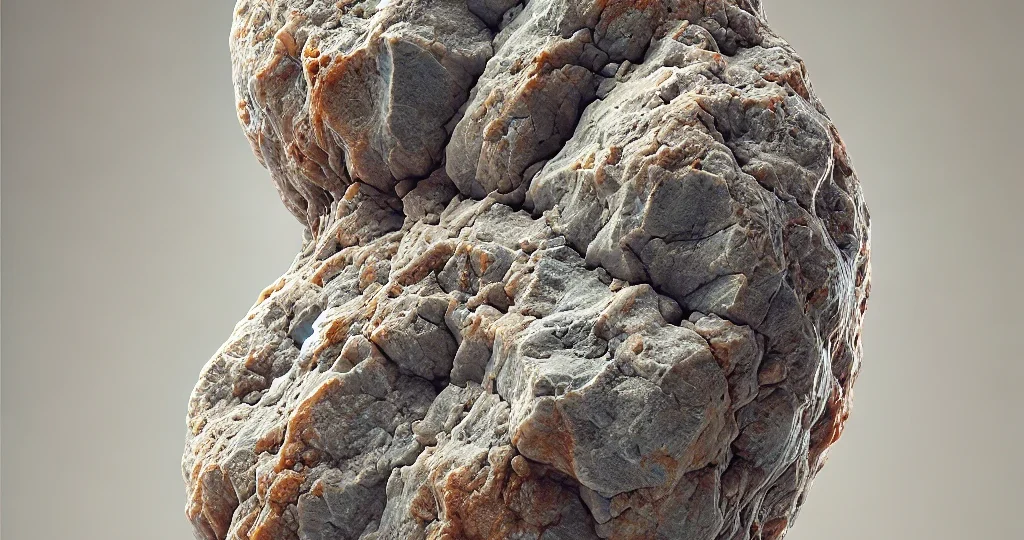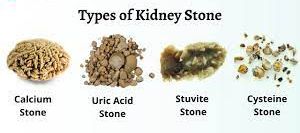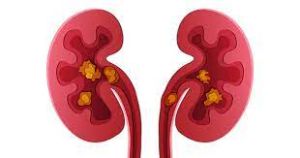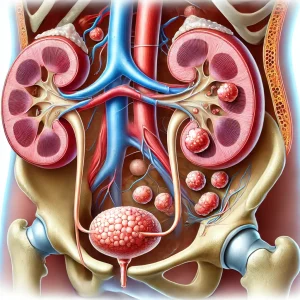
Kidney Stones: Causes, Symptoms, Treatment, and Prevention
Kidney stones are small, hard deposits that form in the kidneys when certain substances in urine, like calcium, oxalate, and uric acid, become too concentrated. They can vary in size and may cause intense pain when passing through the urinary tract. While some stones pass on their own, others may require medical treatment. Understanding the causes, symptoms, and prevention methods can help you reduce your risk and manage kidney stones effectively. In this post, we’ll explore everything you need to know about kidney stones and how to keep your kidneys healthy.

Kidney stones are a common medical condition that affects millions of people worldwide. These small, hard deposits form in the kidneys and can cause severe pain and discomfort when they pass through the urinary tract. We will now discuss the causes, symptoms, and treatment options for kidney stones.
The most common types of kidney stones and their symptoms.
Calcium Stones are the most common type of kidney stone, accounting for approximately 80% of all cases. These stones are formed when calcium combines with other substances such as oxalate, phosphate, or carbonate. The most common cause of calcium stones is a high level of calcium in the urine, which can be caused by a variety of factors such as dehydration, hyperparathyroidism, and certain medications. Symptoms of calcium stones include severe pain in the back or side, nausea and vomiting, and blood in the urine.
Uric Acid Stones are another common type of kidney stone, accounting for approximately 10% of all cases. These stones are formed when there is too much uric acid in the urine, which can be caused by a diet high in purines (found in red meat and seafood), gout, or certain medications. Symptoms of uric acid stones include severe pain in the back or side, nausea and vomiting, and a burning sensation during urination.
Struvite Stones are less common than calcium or uric acid stones, accounting for approximately 10% of all cases. These stones are formed as a result of a urinary tract infection caused by bacteria that produce ammonia. Struvite stones can grow very quickly and can become quite large if left untreated. Symptoms of struvite stones include severe pain in the back or side, fever and chills, and frequent urination.
Cystine Stones are the rarest type of kidney stone, accounting for less than 1% of all cases. These stones are formed when there is too much cystine in the urine, which is a rare genetic disorder. Symptoms of cystine stones include severe pain in the back or side, nausea and vomiting, and a burning sensation during urination.
Causes of Kidney Stones
Kidney stones are formed when certain substances in the urine, such as calcium, oxalate, and uric acid, become concentrated and crystallize. There are several factors that can increase the risk of developing kidney stones, including:
– Family history of kidney stones
– Certain medical conditions, such as gout and inflammatory bowel disease
– Certain medications, such as diuretics and antacids
– High levels of calcium or uric acid in the urine
Symptoms of Kidney Stones

The symptoms of kidney stones can vary depending on the size and location of the stone. Some common symptoms include:
– Severe pain in the back, side, or lower abdomen
– Painful urination
– Blood in the urine
– Frequent urination
– Fever and chills (if there is an infection)
If you experience any of these symptoms, it is important to see a doctor as soon as possible.
Diagnosis of Kidney Stones
To diagnose kidney stones, your doctor may perform a physical exam and order several tests, including:
– Urine tests to check for blood and signs of infection
– Blood tests to check for high levels of calcium or uric acid
– Imaging tests, such as X-rays or CT scans, to locate the stone
Treatment of Kidney Stones
The treatment for kidney stones depends on the size and location of the stone, as well as the severity of the symptoms. In most cases, small stones will pass on their own with the help of pain medication and increased fluid intake. However, larger stones may require medical intervention, such as:
– Extracorporeal shock wave lithotripsy (ESWL): This procedure uses shock waves to break up the stone into smaller pieces that can be passed more easily.
– Ureteroscopy: This procedure involves using a small scope to remove the stone from the ureter.
– Percutaneous nephrolithotomy: This procedure involves making a small incision in the back and using a scope to remove the stone from the kidney.
Prevention of Kidney Stones
There are several steps you can take to reduce your risk of developing kidney stones, including:
– Drinking plenty of water to stay hydrated
– Eating a balanced diet that is low in salt and animal protein
– Limiting your intake of oxalate-rich foods, such as spinach and rhubarb
– Taking medications as prescribed by your doctor
– Seeking treatment for underlying medical conditions that increase your risk of kidney stones
Complications of Kidney Stones
If left untreated, kidney stones can lead to several complications, including:
– Kidney damage
– Blockage of the urinary tract
– Chronic kidney disease
It is important to seek medical attention if you experience any symptoms of kidney stones to prevent these complications from occurring.
Home Remedies for Kidney Stones
In addition to medical treatment, there are several home remedies that may help relieve the symptoms of kidney stones, including:
– Drinking plenty of water to flush out the stone
– Taking over-the-counter pain medication, such as ibuprofen or acetaminophen
– Applying heat to the affected area to relieve pain
– Drinking lemon juice or apple cider vinegar to help dissolve the stone
It is important to note that these remedies should not be used as a substitute for medical treatment.
Disclaimer: The information provided in this content is for general informational purposes only. It is not intended as medical or healthcare advice, diagnosis, or treatment. Always seek the advice of a qualified healthcare professional with any questions you may have regarding a medical condition or healthcare decisions.


